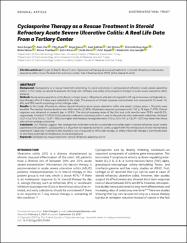Cyclosporine Therapy as a Rescue Treatment in Steroid Refractory Acute Severe Ulcerative Colitis: A Real Life Data From a Tertiary Center
Citation
Evirgen, S., Iliaz, R., Akyuz, F., Cavus, B., Gokturk, S., Ormeci, A., Mutluay Soyer, O., Baran, B., Pinarbasi, B., Karaca, C., Demir, K., Besisik, F., & Kaymakoglu, S. (2022). Cyclosporine Therapy as a Rescue Treatment in Steroid Refractory Acute Severe Ulcerative Colitis: A Real Life Data From a Tertiary Center. Turkish Journal of Gastroenterology. (33)6, pp. 463-469. https://doi.org/10.5152/tjg.2022.21093 Abstract
Background: Cyclosporine is a rescue treatment alternative to avoid colectomy in corticosteroid refractory acute severe ulcerative colitis. In this study, we aimed to evaluate the long-term efficacy and safety of cyclosporine therapy in acute severe ulcerative colitis patients.
Methods: Acute severe ulcerative colitis (basal Lichtiger score > 10) patients who did not respond to 40 mg intravenous methylprednisolone therapy after 3-5 days were included in the study. The presence of clinical response and remission was assessed at 1st week, 1st, 6th, and 12th month according to the Lichtiger index.
Results: In this study, 40 patients, whose steroid refractory acute severe ulcerative colitis and basal Lichtiger score > 10 points were enrolled. The median disease duration was 49.3 months (2-204). All patients received cyclosporine for 132 +/- 78 days (7-270). Clinical response was obtained on seventh day in 82.5%. The clinical response rates of the first and sixth months were 72.5% and 62.5%, -respectively. A total of 17/40 (42.5%) patients underwent colectomy within 1 year. In the patients who underwent colectomy, the basal LS (14.2 +/- 1.9 vs 12.3 +/- 1.7) (P = .002) was higher and the basal hemoglobin value (11.8 +/- 2.3 vs 10.1 +/- 1.5) (P = .037) was lower than those who did not undergo colectomy.
Conclusion: Our findings suggest that cyclosporine treatment may be successfully and safely used in steroid refractory acute severe ulcerative colitis patients. Cyclosporine is a drug that has recently started to come up again with the introduction of new maintenance treatments. Especially in patients who develop a loss of response to infliximab therapy, or where infliximab therapy is contraindicated, or who have azathioprine intolerance, or are unresponsive.

















